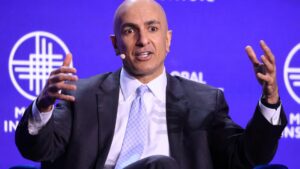The Future of Interest Rates: Insights from Minneapolis Fed President Neel Kashkari
At Extreme Investor Network, we don’t just report the news; we analyze it, offering our readers the insights they need to navigate their financial futures. Recently, we had the opportunity to delve into the expectations set forth by Neel Kashkari, the President of the Minneapolis Federal Reserve, about the future of interest rates and inflation. His comments offer a crucial perspective for investors and consumers alike.
Interest Rate Expectations
In a recent CNBC interview, Kashkari expressed optimism about the potential for interest rates to decline this year, contingent on positive economic data trends. This shift would primarily rely on inflation rates continuing to decrease towards the Fed’s target of 2%. The most recent labor market data supports this outlook, showing resilience and growth that could further bolster the case for rate reductions.
He noted, “Ultimately, our job is maximum employment and stable prices,” emphasizing that if the economic indicators align positively—particularly regarding inflation—it could pave the way for easing monetary policy. This perspective should encourage investors to look for opportunities in sectors that typically benefit from lower interest rates, such as real estate and consumer discretionary stocks.
Current Inflation Landscape
As of December, the headline inflation rate was reported at 2.6% annually, with core inflation slightly higher at 2.8%. While these figures still exceed the Fed’s target, Kashkari anticipates a reduction in housing-related costs—especially rents—which historically have a significant impact on overall inflation rates. This prediction is supported by a compelling economic principle: as housing markets stabilize, we could see a more pronounced easing of inflation.
For investors, this suggests a potential recovery and stabilization in sectors tied to housing and consumer spending. Real estate investment trusts (REITs) may present valuable opportunities as the landscape evolves.
The Fiscal Policy Conundrum
While there is a hopeful outlook for inflation control within the Fed’s framework, Kashkari also highlighted potential challenges posed by evolving fiscal policies. Recent political movements, such as proposed tariffs on major trading partners by former President Donald Trump, could disrupt economic stability and inadvertently reignite inflation. The uncertainty surrounding these trade negotiations makes it imperative for investors to remain vigilant and adaptable.
Kashkari stated, “We’ll have to see what that uncertainty looks like. It’s not simply what we do in America; it’s how other countries respond.” This highlights the importance of considering global economic dynamics when assessing the domestic market.
The Road Ahead
Currently, the consensus among market observers is that the Fed will maintain its current interest rate stance until at least mid-2024. Given the positive trajectory of the economy, Kashkari pointed out that waiting to gather more data on key issues such as tariffs, immigration, and tax policy is a strategic decision.
For investors, this means a careful observation of both economic indicators and geopolitical developments. The interplay between these factors can create both risks and opportunities in the market.
In Conclusion
At Extreme Investor Network, we strive to provide you with actionable insights and expert analysis. Understanding the implications of Federal Reserve decisions, inflation trends, and fiscal policies is vital for making informed investment choices. By staying ahead of the curve and analyzing the interconnected economic landscape, you can better position yourself to capitalize on upcoming market shifts.
Stay tuned with us as we continue to unpack these developments and provide you with the knowledge you need to thrive in today’s complex economic environment.

